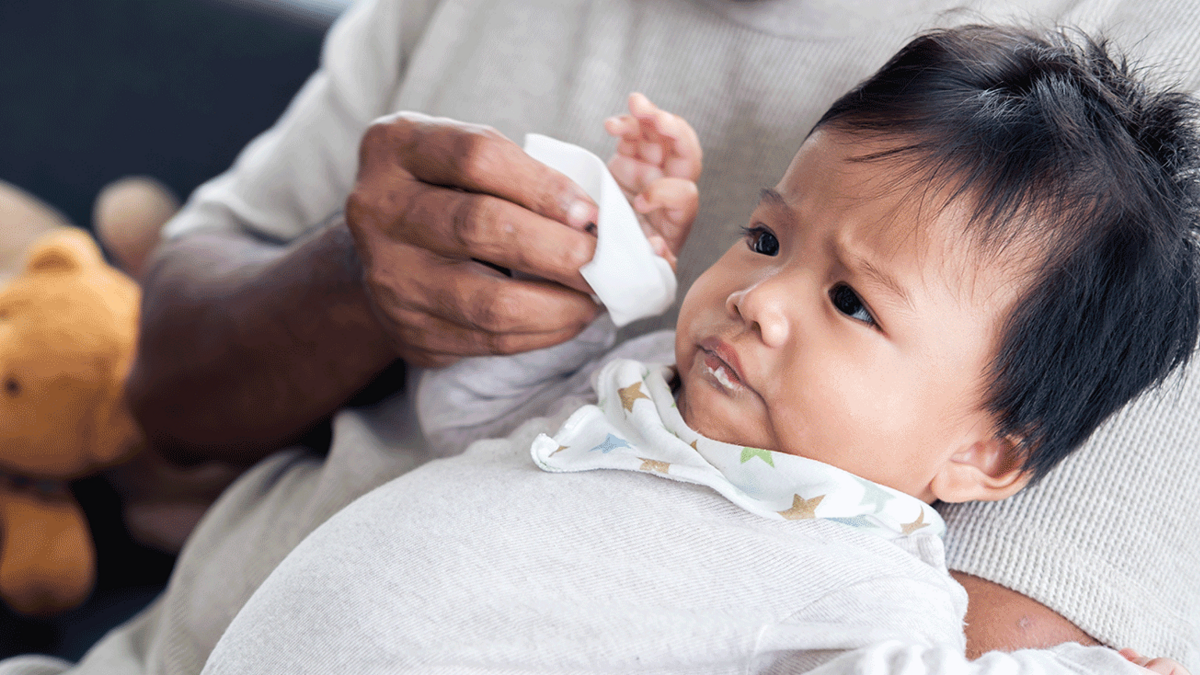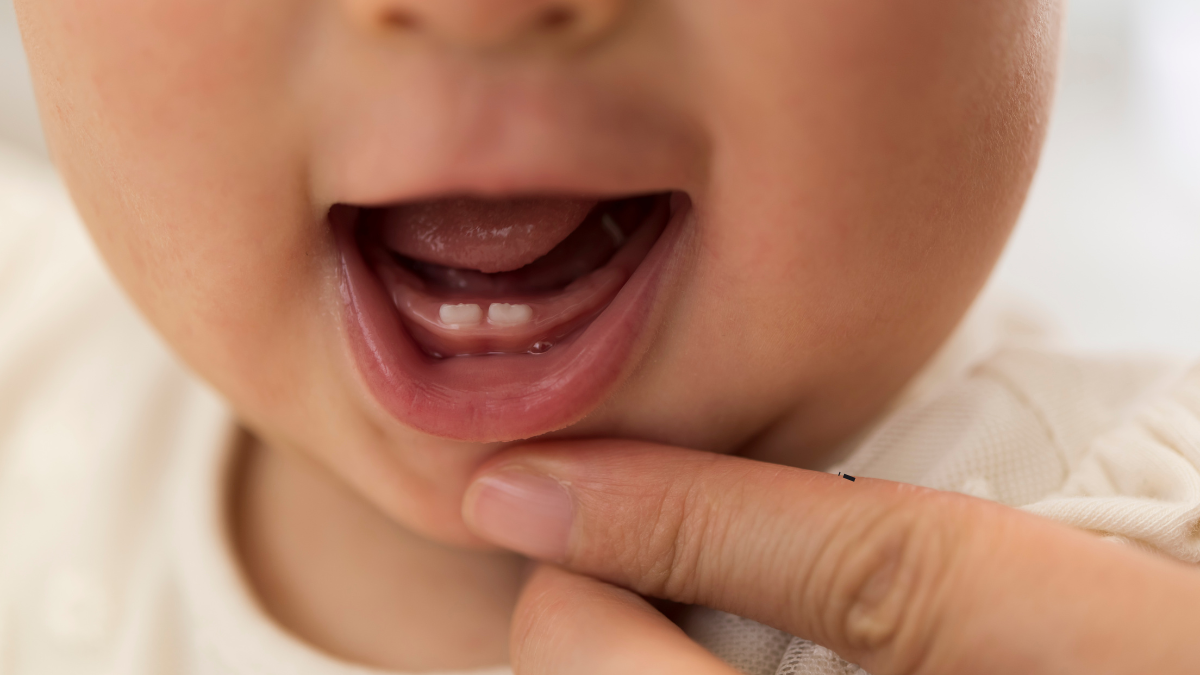As new parents, it’s common to feel like you’re learning about more and more things on a daily basis. You might’ve heard other parents mention it, but when it happens to your little one, seeing them spit up milk after feeding can be quite concerning.
Today, we’ll discuss some of the causes of spit-up in babies and what you can do to help them avoid it. We’re here to ease your mind and set you on the right path in your parenthood journey.
Most babies will spit up at some point, and while it isn’t a harmful or dangerous issue, it can be an upsetting sight for many parents.
That’s why, in this post, we’ll be going over some of the causes of spit-up in babies. We’ll explain why babies spit up, which cases you should be worried about, and ways you can keep them from spitting up.

Why Do Babies Spit Up?
Spitting up or vomiting, also known as “gastroesophageal reflux” (GER), is very common in babies.
Approximately 50% of babies spit up to some extent, which is the scientific term for the act of throwing up a small amount of milk.
To help you understand the reasons behind spit-ups in babies, let’s first start with a quick overview of a baby’s digestive system and why spit-ups happen so easily:
- Immature digestive system – Unlike older children and adults, babies are born with an immature digestive system. The “valve” between the esophagus and the stomach, known as the lower esophageal sphincter (LES), is weaker and less formed, making it easier for milk to come back up.
- Overfeeding – Babies have very small stomachs, so it doesn’t take much for them to feel full. If they drink too much milk, it will overflow and cause them to spit it back up. Babies also tend to swallow more air than adults during feeding, which can cause discomfort and spit-ups.
- Position after feeding – When you lay your baby down after a feeding, it makes it easier for the milk to flow back up from the stomach. It’s important to hold them upright for a period after feeding to avoid spitting up.
- Burping – During feeding, your baby will swallow more air than necessary, causing pressure to build up inside their stomachs. If this air isn’t released through burping, it will push the milk out through spit-ups.
- Normal development – For many babies, spitting up is just a normal part of their development. As they grow older, their digestive system matures, and spit-ups will occur less often.
Related: Are Saline Nasal Drops for Babies Good? Risks and Precautions
When Should I Be Concerned About Spit-Ups in Babies?
Spitting up, in the majority of cases, is harmless and doesn’t need any kind of treatment or solution. However, if you notice any of the following in your child, it’s advisable to consult with a pediatrician right away:
- Failure to gain weight – Babies will spit up when they’re full, but they should only spit up what they’ve consumed. If your baby is spitting up regularly but not gaining weight, it means they’re not receiving enough nutrition.
- Projectile vomiting – Spitting up is the act of vomiting a small amount of milk. However, if your baby is throwing up forcefully and large amounts of milk at once, consult with a doctor. Projectile vomiting in babies is a sign of either pyloric stenosis or gastrointestinal obstruction.
- Blood or greenish color – If you notice blood or a greenish tint in your baby’s spit-up, immediately take them to a doctor. Blood is a sign of injury, and a greenish tint is usually bile, meaning the milk has traveled all the way back to the esophagus.
- Irritability or pain – Some babies show signs of pain, either by crying excessively, having trouble sleeping, or being fussy after a feeding. If your baby displays any of these symptoms, you should consult a pediatrician, as they may have a medical condition like GERD (gastroesophageal reflux disease).
How to Reduce Spit-Ups in Babies
Spitting up is natural and, in some cases, can’t be avoided. However, there are ways to keep it to a minimum, as spit-ups can sometimes be quite messy. Here are some methods to reduce spit-ups:
1. Feed Them Smaller Amounts in Shorter Periods
Overfeeding is one of the most common causes of spit-ups in babies. When a baby drinks too much milk, it causes their stomach to overflow, leading to spit-ups. One of the most effective ways to prevent overfeeding is to feed your baby smaller amounts in shorter periods.
2. Burp Your Baby Frequently
During feeding, your baby will swallow more air than an adult would, causing the air to build up in their stomachs. Burping allows your baby to release this built-up air, which can help reduce spit-ups.
3. Keep Your Baby Upright After Feeding
Holding your baby upright after a feeding helps prevent spit-ups. The milk won’t easily flow back from their stomach to their esophagus, as gravity will keep it in place.
4. Ensure Proper Latch During Breastfeeding
Breastfeeding is a great way to provide nutrition to your baby. However, a poor latch can lead to your baby swallowing air during feeding, which increases the chances of spitting up. Ensure your baby has a proper latch before breastfeeding.
5. Use the Correct Bottle and Nipple for Formula Feeding
If your baby is formula-fed, the type of bottle and nipple can make a huge difference in spit-ups. Bottles that reduce air intake can help minimize spit-ups. Nipples with the right flow rate for your baby’s age are also essential. Check your baby’s age on the bottle packaging to determine the proper flow rate.
6. Smaller, More Frequent Formula Feedings
Like overfeeding with breast milk, giving large amounts of formula is one of the most common reasons for spit-ups. Instead of offering large amounts of formula, try giving smaller amounts more frequently.
7. Keep Your Baby Calm During and After Feeding
Excitement and stress can also contribute to spit-ups. Try to keep your baby calm while feeding, and avoid playing or handling them too roughly afterward.
8. Try Infant Probiotics
Infant probiotics can help improve digestion and reduce spit-ups in babies. However, consult your pediatrician before giving probiotics to ensure they’re safe.
9. Ensure Your Baby Is Sleeping Enough
Sleep plays a crucial role in your baby’s overall health. Lack of sleep or sleep deprivation can cause irritability and digestive issues, such as spit-ups. Ensure your baby is getting enough sleep for their age.
When to Seek Medical Advice
In most cases, spitting up is no cause for alarm and is simply a part of your baby’s development. However, there are some warning signs that you should take your child to see a pediatrician. You should consult your pediatrician if:
- Excessive crying or discomfort – If your baby seems to be in pain, fussy, or uncomfortable, it could indicate a problem with their digestive system.
- Failure to thrive – In addition to not gaining enough weight, failure to thrive indicates that your baby isn’t getting enough nutrition or is becoming dehydrated.
- Projectile vomiting – As stated before, projectile vomiting is a sign of a medical issue, most commonly pyloric stenosis or gastrointestinal obstruction.
- Signs of respiratory distress – Coughing, wheezing, or difficulty breathing after spit-ups may indicate that milk is entering the airway, which can be dangerous.
Conclusion
Spitting up is completely normal and, in most cases, no cause for concern. However, there are ways to make feeding time more comfortable for both you and your baby.
If you ever feel concerned or have questions, don’t hesitate to consult your pediatrician for more guidance. With the right knowledge and support, you can ensure your baby is comfortable and happy while minimizing the mess of spitting up.
Save the pin for later

- 8th Month Pregnancy Care: What To Expect, Dos And Don’ts - January 17, 2026
- 80 Beautiful Hispanic Girl Names for Your Baby - January 8, 2026
- 7 Physical Signs Your Baby Still Isn’t Ready to Come Out - November 28, 2025



